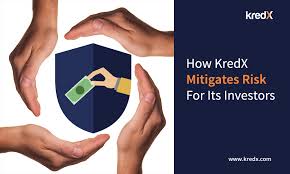
How KredX Mitigates Risk For Its Investors
As India’s first invoice discounting marketplace, we are often asked how KredX minimises the risk to investors. We’re here to tell you just that. We’ll also break down the risk mitigation process we follow here to give our investors a worry-free investment experience with high returns in a short turnaround time.
But First, A Quick Recap Of KredX
KredX is an Invoice Discounting marketplace where businesses (vendors) who require funds for the regular running of their company connects with investors on the KredX platform who can provide the funds they need. Businesses receive an invoice for delivered goods or services from a blue chip company. The business then uploads the invoice on the KredX platform after discounting the total amount. Investors see the available invoices when they log in to the platform and purchase the ones that interest them. The funds are then transferred to the business in 48-72 hours. In essentiality, the business foregoes a small amount of their profit for a quicker payment that otherwise takes 90 days on an average. This ensures that their cash flow isn’t affected. In turn, the investors get lucrative returns on funds that were sitting idle in a short time at a much higher rate than what banks offer in traditional investments.
The KredX Risk Mitigation Process
The KredX business model is one where the investors do not face any execution risk. To help put things into perspective, a traditional loan faces execution risk as it is taken for an event that is yet to happen in the future such as a house that is being built, a car that could go out of the market, etc. The asset investors invest in at KredX is a service that has already been executed and an invoice already raised against. Further, to ensure that the investor is never affected, we minimise the risk involved at multiple levels through the KredX process.
Risk evaluation at the business-onboarding stage is a three-pronged process at KredX dependent upon the business, the enterprise and their relationship status.
- Businesses are evaluated based on their credit credentials, financial robustness and stability. To gain an understanding into the business credit credentials KredX follows the standard practice of pulling credit reports for the main directors and the company. The credit scores provide a peek preview into the larger pool level risk involved but it is the finer details in the different reports which make all the difference in evaluation of credit history. Similarly all necessary documentation is collected to understand the financial strength and stability of the business. Unlike some of our competitors in the space who rely largely on information on the digital medium we collect the information directly from the business and augment/ validate it with the data available in digital form.
- Enterprises are looked at from a credit worthiness perspective as well as the confidence KredX has on compliance, regulatory practices and integrity of the company. We also take into account the credit ratings, fundraising abilities, market news and current liquidity position to ascertain the same. The enterprise too follows a strict vendor selection process. This ensures that the vendor/business that an investor sees on the KredX platform has been through multiple levels of screening and is among the most credible businesses around.
- Finally, KredX takes into consideration the relationship the business has enjoyed with the enterprise. KredX ensures that all payments for services to the business has been made on time by the enterprise. Though not mandatory, a longer working relationship between the two parties is preferential
- Based on these factors a combined KredX score is generated which is an amalgamation of various features quantified into a single value. Like all other scores this does a good job at the high level of pooling credit risk but it may not be the best tool in the hands of an uninformed investor making decisions solely based on the score unless the investments are well-diversified into multiple deals and multiples level of risk. (More on this in another blog)
Ultimately using all the data points gathered and after taking into account the legalities of each case a business may get approved for being listed on the platform for a pre-specified amount determined by the risk team at a rate which suits both the business and investors.
- Once the business has been onboarded onto the KredX platform, we verify the invoices presented by the businesses to ensure that they are genuine and not already paid for.
- Additionally, we leverage the relationship between the enterprise and the business to further reduce the risk to our investors to a minimum. At the outset we prefer to work with companies having a deep relationship with the enterprise but it is more of a guiding principle as opposed to a mandate.
- The credit risk is further alleviated by bringing the enterprise in the loop using legal mechanisms such as an undertaking, bill of exchange and other similar forms.
- By the use of such mechanisms, the fund flow is ensured via KredX operated Escrow accounts in all the cases. This provides an added layer of security against credit risk as a result of the discounting mechanism.
As is the case with any investment, an investor is required to make an informed decision before purchasing a deal on the KredX platform. All the important data points after evaluation by the KredX risk team are summarised and put in vendor, enterprise and deal reports. The investor is required to go through all the reports thoroughly before investing. After all the risk is being borne by them and they are the ultimate beneficiaries on the supply side. Should our investors have any queries with our process or their accounts, they can always reach out to us at care@kredx.com. The KredX team is always around to answer our customer’s queries and assist them in any way that we can.



